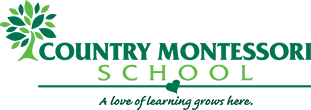What is Montessori, and why should I choose Country Montessori School for my family?
The Montessori Method is a child-centered educational philosophy developed by Dr. Maria Montessori, an Italian anthropologist and physician. It emphasizes hands-on, self-paced, and collaborative learning in a prepared environment. Unlike traditional education systems, Montessori is not affiliated with religious or political organizations.
At Country Montessori School (CMS), we provide an authentic Montessori experience based on Dr. Montessori’s principles and the American Montessori Society (AMS) standards. Our program fosters children’s innate desire to learn by offering a carefully prepared, child-friendly environment where students can explore, discover, and grow at their own pace.
What is the difference between AMS (American Montessori Society) and AMI (Association Montessori Internationale) schools?
Dr. Maria Montessori, along with her son Mario, founded AMI in 1929 to preserve the original philosophy and practices of Montessori education. AMI schools strictly adhere to Dr. Montessori’s original methods, ensuring the materials and teaching techniques remain unchanged.
In contrast, AMS was founded in 1960 by Nancy McCormick Rambusch, who adapted the Montessori method to suit American culture and educational needs better. AMS schools blend Montessori principles with innovative teaching techniques, incorporating supplemental resources and materials to enrich the curriculum.
What is meant by the “spiritual” development of the child?
At CMS, “spiritual” development refers to fostering inner peace, concentration, and emotional well-being. These qualities help children feel calm, focused, and ready to learn.
While CMS is a secular school, we emphasize grace, courtesy, and respect in the classroom. Materials are thoughtfully organized, and lessons are conducted by Montessori-trained teachers who model these principles, creating a harmonious learning environment.
Why are there no traditional grades in Montessori schools?
Montessori schools focus on personalized learning rather than standardized grading. At CMS, assessment is embedded in daily activities through observation, record-keeping, portfolios, and student presentations. This approach helps teachers tailor lessons to each child’s progress.
Standardized testing begins in lower elementary and continues annually for older students. However, the primary goal is to nurture a love for learning by allowing children to work at their own pace, free from competition or external pressure. The inclusion of standardized tests is intended to help prepare students for what they will encounter along their educational journey and provide an additional data point of reference for teachers to support the individualized needs of their students.
Why are there children of different ages in the same Montessori classroom?
Dr. Montessori believed that multi-age classrooms reflect real-world communities where collaboration and mentorship thrive.
At CMS, children are grouped in age spans of 2-3 years. Older students serve as role models and mentors, while younger students gain inspiration and learn by observing their peers. This system encourages children to progress at their own pace, mastering skills as they are developmentally ready rather than by age or grade level.
Is food provided for my child?
CMS provides a healthy morning snack for Early Childhood students. However, elementary students bring their own snacks. Lunches are not included in tuition.
Due to individual dietary needs, we ask parents to provide nutritious lunches for their children. For added convenience, we offer lunch options through local restaurants, which can be ordered separately.
What are the benefits of Montessori education compared to traditional schools?
Montessori education emphasizes self-directed learning, fostering independence, critical thinking, and problem-solving skills. Unlike traditional schools, Montessori classrooms allow students to work at their own pace, explore subjects of interest, and develop a lifelong love of learning.
At CMS, we provide a structured environment that balances freedom with responsibility, ensuring students are well-prepared for future academic and social success. Our graduates transition seamlessly to traditional schools, often excelling academically and socially.
What is the teacher-to-student ratio at Country Montessori School?
At CMS, we maintain a low teacher-to-student ratio to ensure personalized attention for each child. This allows our Montessori-trained teachers to observe, guide, and support individual learning paths.
For Early Childhood programs, the ratio is typically 1:12, while elementary classrooms have a ratio of 1:10, ensuring every child receives the care and guidance they need to thrive.
How do Montessori students transition to middle or high school?
Students who graduate from CMS are well-prepared for the transition to middle and high school. They develop strong academic skills, independence, and self-motivation. Our alumni have successfully enrolled in top middle and high schools, excelling in academic and extracurricular activities.
Parents looking for a Montessori kindergarten near me often choose CMS for the long-term benefits of Montessori education, knowing it lays a strong foundation for their child’s future.
What extracurricular activities are available at CMS?
CMS offers a variety of extracurricular activities, including coding and programming courses (elementary), art, music, Spanish, computers, and physical education. These programs complement the Montessori curriculum by providing opportunities for creative expression and skill development outside the classroom.
We also offer seasonal events and after-school enrichment classes, ensuring a well-rounded experience for every student.
How does CMS handle discipline?
Montessori education emphasizes positive discipline, focusing on guiding children toward self-regulation and responsibility. At CMS, we model and encourage respectful communication, problem-solving, and conflict resolution.
Grace and courtesy lessons are a key part of our curriculum, helping children learn how to interact positively with their peers and teachers.
What makes CMS different from other private schools?
CMS stands out for its commitment to providing an authentic, high-quality Montessori education. Our experienced Montessori-trained teachers, low student-to-teacher ratios, and comprehensive curriculum ensure a nurturing and enriching experience for every child.
We’re more than just a school—we’re a community that supports families in raising confident, curious, and capable learners.
